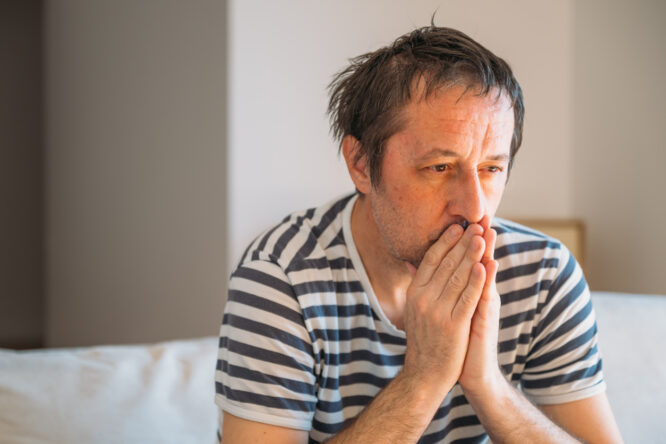Anxiety doesn’t always come out of nowhere.

Sometimes it’s not about what’s happening right now, but something deeper that’s been brewing beneath the surface. If you want real relief, digging into the root can help you understand what your mind and body are trying to say. Here’s how to figure out what’s causing you to feel so uneasy and overwhelmed so that you can start feeling better.
1. Pay attention to when it shows up, not just how it feels.

We often focus on the symptoms of anxiety—racing thoughts, tight chest, or restlessness—but noticing the timing can be just as important. Does it spike in the morning? Before social plans? Right after a specific kind of conversation? Patterns often point to causes. Your anxiety might be tied to certain routines, relationships, or situations you haven’t fully unpacked yet. Once you track the “when,” it gets easier to explore the “why.”
2. Ask yourself what you’re afraid will happen.

Anxiety loves to hide in vague fears, but if you can name what you’re worried about—rejection, failure, being misunderstood—it often loses some of its grip. Clarity doesn’t erase anxiety, but it softens it. When you get specific, you give your brain something solid to work with instead of letting it spiral through endless what-ifs. That one question—“What am I actually afraid of right now?”—can unlock a whole new understanding.
3. Reflect on early environments where you felt unsafe.

Even if your childhood seemed “fine,” there might’ve been moments where your nervous system learned to stay on alert—like being around unpredictable moods, silent tension, or pressure to always be “good.”
These early experiences often plant the seeds of anxiety, long before you even know the word for it. Tracing back to those environments can help you see why your body reacts the way it does now, even when everything seems okay on the outside.
4. Notice which topics you automatically avoid.

Sometimes what we don’t talk about holds more weight than we realise. If there’s a situation or subject you keep dancing around—whether it’s work stress, relationships, or unresolved hurt—that avoidance can quietly fuel anxiety. Your brain often creates pressure around what it doesn’t want to face. Gently asking why something feels off-limits can reveal the emotional load sitting just beneath the surface, and help it feel lighter as time goes on.
5. Pay attention to physical signals, not just thoughts.

Anxiety often shows up in the body before it hits your thoughts. That tightness in your jaw, your stomach dropping, or your heart racing out of nowhere—it’s all information. Your body might be reacting to something you’re not consciously registering yet.
When you pause and tune in physically, you get closer to what’s actually going on. Sometimes your body knows long before your brain has caught up. That’s not weakness; it’s insight.
6. Explore what you believe about control.

If you feel a constant urge to plan, fix, or anticipate everything, there might be an underlying fear of what happens when you’re not in control. That belief—that bad things will happen unless you’re always on alert—fuels anxiety without you realising it.
Looking at where that belief started can help you loosen its grip. Maybe it protected you once, but it doesn’t have to run the show now. You don’t have to let anxiety be in charge of every moment just to feel safe.
7. Ask yourself who you feel responsible for emotionally.

Carrying other people’s emotional weight is a quiet anxiety trap. You might feel like it’s your job to keep other people happy, avoid upsetting them, or stay hyper-aware of their moods at all times. That kind of anxiety often comes from early experiences where you learned that love meant managing someone else’s emotions. Untangling that isn’t easy, but recognising it is the first step toward relief and healthier boundaries.
8. Revisit moments that felt like emotional whiplash.

If you’ve ever gone from feeling safe to suddenly being criticised, left out, or hurt, your brain may have started seeing calm as temporary. That keeps your nervous system on edge, waiting for the next drop. Looking at those moments, especially if they happened more than once, can explain why you struggle to relax, even when everything seems fine. It’s not about overreacting. It’s about protecting yourself from a pattern your body remembers.
9. Think about what you were praised or punished for.

Were you rewarded for staying quiet, being helpful, or achieving? Were you ignored when you had needs? That kind of emotional conditioning can create anxiety around simply existing as you are, rather than being who everyone else wanted you to be. Your anxiety might not be about what’s happening now—it might be about who you had to become to stay safe, liked, or worthy back then. Unpacking that opens the door to reconnecting with your actual self.
10. Consider how you handle stillness.

When things go quiet, does your brain race? Does rest feel uncomfortable or pointless? If so, anxiety may be tied to a belief that stillness equals danger, laziness, or missed opportunities. Many people learn to associate peace with vulnerability. Exploring where that discomfort with rest came from can help you build a healthier relationship with downtime—one where you can breathe without guilt or panic.
11. Ask what you’re trying to outrun emotionally.

Anxiety often acts like a smoke screen. It keeps you busy, alert, and distracted—so you don’t have to sit with whatever’s underneath. That could be grief, loneliness, anger, or disappointment you haven’t had space to feel. It’s not about blaming yourself. It’s about realising that your anxiety might be working overtime to protect you from something you’ve been carrying for a long time. The relief comes when you give yourself permission to stop running.
12. Notice when anxiety feels familiar, not just intense.

Sometimes the most telling clue isn’t how strong your anxiety feels—but how weirdly normal it is. If being on edge feels more comfortable than being calm, your nervous system may be more used to survival mode than safety. Recognising that pattern allows you to start gently rewiring it. It’s not about never feeling anxious again—it’s about slowly showing your mind and body that safety doesn’t have to feel suspicious or foreign. That’s where real healing starts.




